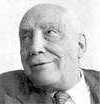Salama Moussa
Salama Moussa ( Arabic سلامة موسى, DMG Salāma Mūsā ), (* 1889 in Zagazig ; † August 4, 1958 ), a famous writer and thinker in the Arab world, was known for his wide-ranging interest in science and culture as well as his firm belief in the inexhaustible power of the human intellect as a guarantee for progress and prosperity.
Life
Moussa was born near Zagazig. From 1908 he traveled to Europe; studied literature, philosophy, humanities and natural sciences in Paris and London . During his lifetime he proved to be an uncompromising advocate of scientific and social reorganization and saw the industrial and cultural revolution as the basis for any further development in personality and society. Despite this background, he always endeavored to maintain the Egyptian identity and to separate it from the West.
He did not always succeed in asserting himself in the balancing act of feudal ruled Egypt, which was shaped by Islam , especially since he himself belonged to the Christian minority, the Copts . His vehement demand for the simplification of the Arabic language and grammar also heated up criticism of his conservative opposition in the Arab world. He ruthlessly censured the entire Arabic language area, which is characterized by diverse dialects, and a high-level Arabic language that has remained unchanged for generations and that the average citizen, the majority of whom are illiterate, does not understand. The discussion about the simplification of the Arabic language continues today. Salama Moussa's writings are in greater demand than ever in the Arab world. They are constantly being reissued, and his universal ideas find strong sales.
Salama Moussa was, among other things, the mentor of the writer Nagib Machfus , who once quoted his teacher as follows: “You have a lot of talent, but your stories are not good.” After that, Nagib Machfus began to choose his subjects more carefully.
He was married to Emilie; their eldest son is the bacteriologist and publisher Raouf Salama Moussa .
literature
- Suleman Taufiq: New life on the divan . In: Die Welt , September 18, 2004; A little history of Arabic literature
Web links
- The education of Salama Moussa . (English)
- An overview of the mutual relationship between Nagib Machfus and Salama Moussa
- Salama Moussa - the literary oeuvre
- Short biography of Salama Moussa (Arab philosophers)
| personal data | |
|---|---|
| SURNAME | Moussa, Salama |
| BRIEF DESCRIPTION | Egyptian writer and thinker |
| DATE OF BIRTH | 1889 |
| PLACE OF BIRTH | Zagazig |
| DATE OF DEATH | 4th August 1958 |
